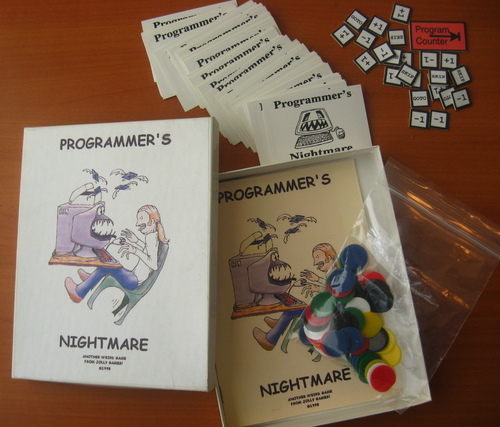I think a mix between RPG and Trivial Pursuit would be nice. This is a first draft of the concept.
The board & cards
The board would be something similar to Trivial Pursuit, except that each case has is own title that would be either "Generic Question", "Hard Question", "Bounty Question" or "Subjective Question".
For the cards, it would be a set of card on which there is random tag written on it. (c#, php, java, strings, mysql, mssql, etc.)
Beginning
To start the game everyone has to pick a character (either a real one like Jon Skeet or a fictive one you can create). Every character has bonus related to tags (C#, Java, PHP, strings, etc.) that will modify your performance during the game. Additionally, everyone starts with 1 reputation.
The Gameplay
The person that starts is random. When it's your turn, you roll the dice to move forward. Depending on the case that you arrived, what happens during that turn is different. During those question, you will earn reputation that you can use strategically during the game (it will be explained after).
Generic Question
When you arrived on a "Generic Question", a random card is selected to determine the tags of that question. When the tags are determined people can choose to answer or not the question. If they choose to answer the question, they roll the dice and they multiply that score with the bonus they have associated to that tag. This will be the number of upvote they have on that question. The person with the highest number of upvote win the question, gets a bonus 15 reputations and it's his turn to play next.
Example : I arrived on a "Generic Question" case and the card that is randomly picked has the following tag : [c#]
My character has the following bonus [php] : 8 [java] : 2 [c#] : 1 ... and the rest is 0. Since I have a bonus in c#, this mean I can gain some points on that question. So I will answer it. I roll the dice and I get a 6. So my total score for this question is 6 upvote (60 reputations). Unfortunately for me someone is playing is playing Jon Skeet and he answer that question. Luckily he rolls a 1, but his modifier for that question is 5 so he gets 5 upvote (50 reputations). So for this turn I won the question (+15 reputation) and I get to roll again.
Hard Question
It's the same thing as a generic question expect that you must have at least a bonus multiplier of 3 for the tag that is picked in order to answer the question.
Bounty Question
It's the same thing as a generic question expect that you get a random bonus of 50 to 500 if you won the question.
Subjective Question
It's the same thing as a generic question expect that the reputation you gain is multiplied by 5.
The Reputation
As the game goes, you will earn reputation that you will make you gain power :
- With 100 reputations, you can downvote an answer at the cost of 5 reputation. It will make the one you downvoted lose 10 reputation. That ability has a cooldown of 1 question.
- With 500 reputations, you can retag questions. Once a question is retag, it cannot be retag. That ability has a cooldown of 4 questions.
- With 1000 reputations, you cast a vote to close a question. If 2 people cast a vote to close a question. The question cannot be answered by anyone. That ability has a cooldown of 4 questions.
- With 2500 reputations, you can delete an answer. No reputation will be awarded for that answer and the person cannot win the question. That ability has a cooldown of 9 questions.
- With 2500 reputations, you can re-open closed question. That ability has a cooldown of 9 questions.
- With 2500 reputations, you can lock a subjective question. This will make everyone that has under 100 reputation unable to answer that question. That ability has a cooldown of 2 subjective questions.
How it finish
It finishes when you arrive first in the middle. Having the highest reputation doesn't make you win automatically, but it helps you make nasty thing during the questions.


